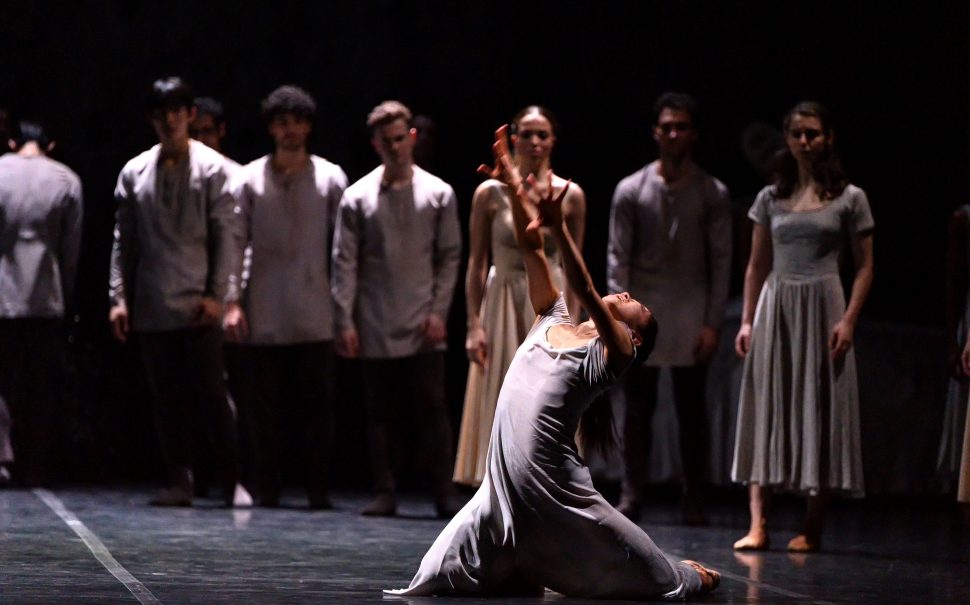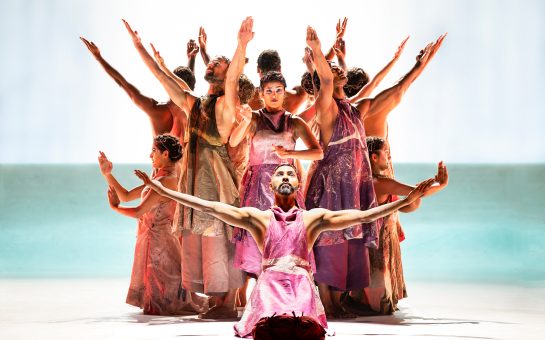Akram Khan’s reimagined version of Giselle, performed by English National Ballet, presents a haunting tale of love and redemption with a modern twist at Manchester’s Palace Theatre.
Giselle, the prototypical romantic ballet, is given a contemporary makeover with powerful choreography.
The original ballet was choreographed by Jean Coralli and Jules Perrot and premiered in 1841 in Paris. Akram Khan’s version for ENB was first performed, to acclaim, in 2016 at the Palace Theatre in Manchester – where it now returns.
The score was adapted by Vincenzo Lamagna, adapted from Adolphe Adam’s original.
Inspired by works of the lyrical poets Heinrich Heine and Victor Hugo, the original ballet tells the tragic story of a peasant girl named Giselle whose ghost, after her premature death, protects her lover, Albrecht, from the vengeance of a group of evil female spirits called Wilis and their queen Myrtha.
Akram Khan’s version creates a passionate, earthy style with a beautiful blend of Indian kathak and contemporary dance. Performing as ethereal spirits, the dancers gave a fluent presentation that defied gravity.
Erina Takahashi personified Giselle’s emotions and naivety in striking movements. The performance was excellent and Takahashi had no problems conveying the youth and innocence of Giselle. Khan’s intensely physical and rhythmic choreography was astonishing, from undulating torsos to fanned hands.
The audience was introduced to the first act where Giselle sways as her collective works together to try to demolish a wall. The wall, which separated the factory workers or ‘Outcasts’ from a new life of hope and security, stood solid, so the workers remaineed bound by the enclosure.
Her wealthy lover, Albrecht, who was played by the talented James Streeter, disguises himself as an Outcast to visit her – but he is caught by Giselle’s would-be-lover Hilarion, played by Ken Saruhashi.
In the thrilling first act, Albrecht woos Giselle in an intimate ‘pas de deux’ (duet) imbued with tenderness and adoration. A grand jeté rounded off the dance – before the factory Landlords arrive for a surprise visit.
Albrecht’s fiancée, Bathilde, is among the Landlords – he tries to hide from them while the Outcasts dance for their visitors. The ceremony consisted of springing jumps and effortless fouettés, to the gracious orchestration by Gavin Sutherland.
The magic performance was suddenly disturbed by a conflict between Albrecht and Hilarion – which initiated a goosebump-inducing transformation from love to hate, as the lights became heavy and the bass of the orchestra got deeper. Bathilde’s father interrupts as he forces Albrecht to return to Bathilde. Driven mad with grief due to the betrayal, Giselle perilously collapses – and dies. The wall instantly turns red.
In the second act, Emma Hawes made a splendid Myrtha, channelling a statuesque and commanding presence. She orders her army of Wilis to take Albrecht’s soul by dancing him to his death in the underworld. Myrtha summons Giselle from her body to join the realm of death in an intimidating, fabulous dance with sticks, flickering finger movements mimicking a spell chant and the flowing movement of her dress and hair.
Yet defying Myrtha’s command, Giselle forgives Albrecht and releases him back to life after their last dance – before the detailed three-dimensional set allows Myrtha and the Wilis to depart with Giselle into the afterlife, leaving Albrecht an outcast from his family, by the wall and alone.
One of the most important aspects of Giselle was the difference between the two acts – between the physical world and the supernatural. This was achieved through lighting, sound and the dancers’ physicality. Sharp, lateral-moving motions in the first act encapsulated the life and soul within the characters, compared to haunting, serpentine movements from Myrtha and the Wilis with a vaporous ghostliness of the smoke on the stage during the second act.
As the curtains closed, tears welled in my eyes. I had felt every emotion from the perfectly coached and curated dances. Akram Khan’s adaptation of Giselle has everything the original has and more.
English National Ballet’s production is at the Palace Theatre until 21 October before touring to the Bristol Hippodrome. Tickets here.
Featured image: Erina Takahashi in Akram Khan’s Giselle ©Laurent Liotardo



